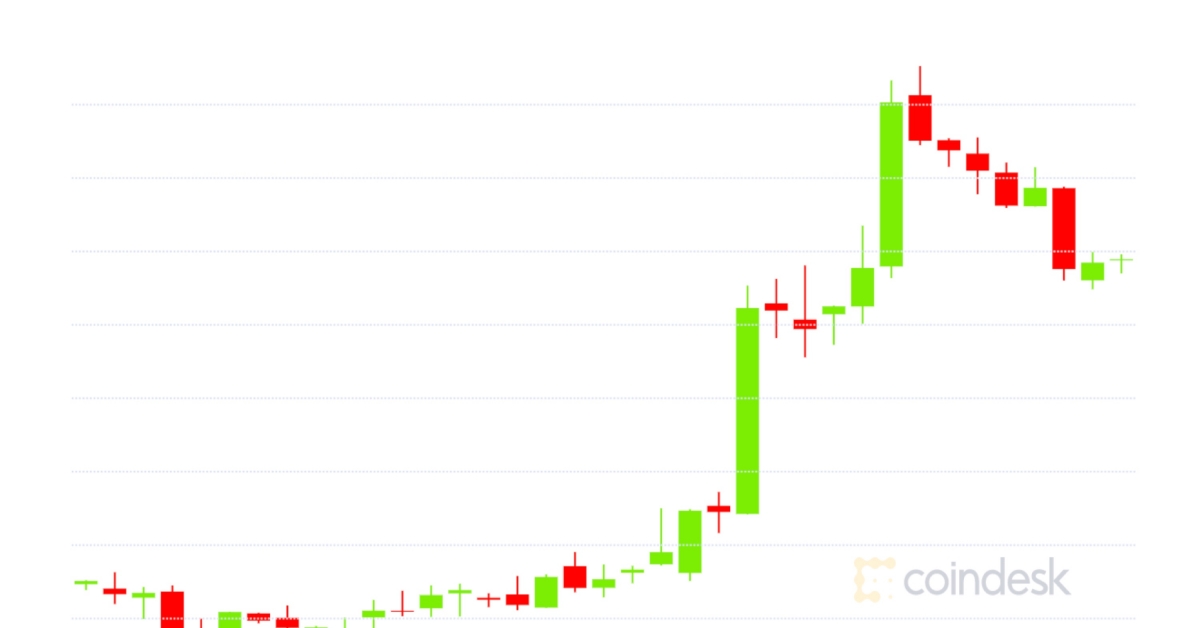The Protocol: Lido Backers vs EigenLayer
/arc-photo-coindesk/arc2-prod/public/LXF2COBSKBCNHNRE3WTK2BZ7GE.png)
I must admit to choking on my tequila drink a couple weeks ago after hearing the phrase “investable asset class” applied to the category of digital tokens known as meme coins. But for many investors and projects, the opportunity is being taken quite seriously. See our riff below.
-
SCOOP: Lido backers are stealthily funding a competitor to EigenLayer.
-
JUST IN: Brothers accused by U.S. authorities of exploiting MEV-boost, the software used by most Ethereum validators, and stealing $25M.
-
Vitalik Buterin hammered out an Ethereum improvement proposal in 22 minutes flat.
-
With Colony Lab’s new “liquid vesting” feature, you can have your bags and keep them too.
-
Runes transactions appear to have tapered off.
-
Top picks from the past week’s
Protocol Village
column: Hyperbolic, Lens, zkSync, Polkadot, CoinDCX, Cyber, OP Stack.
-
$100 million of blockchain project fundraisings: Polymarket, Humanity Protocol, Owlto, Arcium, AgriDex, Zest, Hylé.
This article is featured in the latest issue of The Protocol, our weekly newsletter exploring the tech behind crypto, one block at a time. Sign up here to get it in your inbox every Wednesday. Also please check out our weekly The Protocol podcast.
:format(jpg)/cloudfront-us-east-1.images.arcpublishing.com/coindesk/OZCSUM2HDFGXNAIMJNRDHGMZPQ.png)
Network news
MEME RUSH! An industry source told me over margaritas a few weeks ago, “You’re starting to hear venture capital firms make the argument that meme coins are becoming an investable asset class.” What’s undeniable is that meme coins are popping, and there does appear to be a thriving industry in promoting them. In April alone, CoinMarketCap added 138 meme coins to its listings, versus 18 in the same month a year earlier, bringing the total to 2,229, with a market capitalization of more than $50 billion, as reported by our Omkar Godbole. Last week, VanEck, a crypto-friendly institutional investment firm, started a new Meme Coin Index, tracking prices of doggy-themed tokens dogecoin (DOGE) and dogwifhat (WIF) as well as other ridiculousness like BONK. Another dog token, FLOKI, shared the title sponsorship for a cricket series between Pakistan and Ireland. Crypto analysts are talking up the election-related meme coins TRUMP and BODEN, and tokens associated with the X-Men character Wolverine flooded several blockchains after TheRoaringKitty, the personality behind the GameStop meme stock frenzy, posted a related video on X. Even independent Bitcoin programmer Jimmy Song, often a vocal critic of non-Bitcoin token creation, wrote in a Substack post that he appreciated the “honesty” of the movement: “Meme coins obsoleted the VCs and ultimately brought some more honesty to the Nietzschean will-to-power games that were always being played.” Speaking of Bitcoin, the OG blockchain now has meme coins too, many of them created with the Runes protocol launched last month. Sovryn, a decentralized trading platform with Ethereum-compatible smart contracts and secured by Bitcoin through merge-mining on the Rootstock sidechain, announced Wednesday that it has created a fully-premined rune called POWA, airdropped the tokens to users and established pools for trading them. “Runes provide a way for projects to create and distribute tokens natively on the Bitcoin blockchain for memes,” Sovryn said in a press release.
STAKERS NOW RESTAKERS? Our Sam Kessler has the scoop: “The co-founders of Lido, the biggest liquid staking protocol on Ethereum, are secretly funding a competitor to EigenLayer, the buzzy “restaking” service that has emerged rapidly this year to become a powerful force in decentralized finance. According to several people with knowledge of the matter, the project is called Symbiotic and has drawn backing from not only the Lido co-founders, Konstantin Lomashuk and Vasiliy Shapovalov, through their venture firm Cyber Fund, but also Paradigm, the crypto venture capital firm that is one of Lido’s lead investors. CoinDesk also obtained internal Symbiotic documents that describe the project, which allows users to “restake” using Lido’s staked ether (stETH) token and other popular assets that are not natively compatible with EigenLayer.”
JUST IN: Two brothers have been arrested by the U.S. Department of Justice for attacking the Ethereum blockchain and stealing $25 million of cryptocurrency during a 12-second exploit, according to an indictment unsealed on Wednesday.
THE WORDS OF VITALIK. We’ve written quite a bit in The Protocol newsletter about just how prolific (and prolix) the Ethereum co-founder Vitalik Buterin can be as a writer. It’s also true that when he writes, people tend to write a lot about whatever he writes – such as this opus on “multidimensional gas pricing,” which Decrypt covered. But apparently Buterin is also crazy fast as a scribbler, especially when it comes to banging out Ethereum improvement proposals on deadline, as chronicled on Tuesday by our Margaux Nijkerk. With time ticking down toward an important meeting to discuss new Ethereum wallet standards, it took Buterin just 22 minutes to draft EIP-7702, offered as a substitute for an earlier proposal, EIP-3074, that had drawn complaints from some developers. The hot-off-the-press publication drew plaudits from critics, with much of the Ethereum community quickly coming around in support of replacing the earlier effort with Buterin’s proposed solution.
:format(jpg)/cloudfront-us-east-1.images.arcpublishing.com/coindesk/V5E6QSLDNNFGPHZHXXIUN242TE.jpg)
The courtroom where Tornado Cash developer Alexey Pertsev was sentenced. (Camomile Shumba/CoinDesk)
Alexey Pertsev, 31, a developer of the coin mixer Tornado Cash, has been found guilty of money laundering by a Dutch judge, and was given 64 months of prison time. The case, along with other recent actions brought by prosecutors around the world, has raised questions about the extent of responsibility that developers might bear for any code they write. As reported by our Camomile Shumba, prosecutors in the Dutch case made the argument that Pertsev “should have at least suspected the criminal origins of illicit transactions on the Tornado Cash platform.”
Solana-based crypto trading protocol Cypher has endured its share of hacks and heists. But its latest loss was an inside job. On Tuesday, a pseudonymous developer known as Hoak admitted to stealing hundreds of thousands of dollars worth of cryptocurrencies from Cypher’s hack reimbursement fund. “I took the funds and gambled them away,” Hoak said in a statement, blaming his activity on a “crippling gambling addiction.”
El Salvador set up a new website to track its $350 million bitcoin stockpile, Bitcoin Magazine reported.
Degen Chain, an Ethereum layer-3 blockchain dedicated to meme coins, came back online after a two-day outage. (Launched in March, Degen Chain is an “an ultra-low-cost L3 for the Degen community built with Arbitrum Orbit, Base for settlement, and AnyTrust for data availability,” according to a blog post at the time by Syndicate, the blockchain’s infrastructure partner.)
ICYMI: CoinDesk’s Danny Nelson takes a look inside the shadowy world of crypto influencers known as “key opinion leaders,” or KOLs, who invest in the projects they promote on social media – in return for the privilege of selling out before other investors.
Protocol Village
Top picks of the past week from our Protocol Village column, highlighting key blockchain tech upgrades and news.
:format(jpg)/cloudfront-us-east-1.images.arcpublishing.com/coindesk/JGMGY3R7VJGPRIH35MSV6KJ3GI.png)
Hyperbolic’s Proof of Sampling architecture (Zhang et al)
1. Hyperbolic, the two-year-old startup that math olympian Jasper Zhang leads focused on decentralized AI computing, said Thursday that it is introducing a protocol called “Proof of Sampling (PoSP),” aimed at addressing challenges with trust in decentralized AI networks. Hyperbolic was co-founded in 2022 by Zhang and Yuchen Jin, who holds a Ph.D. in computer science from the University of Washington.
2. Lens Lab, a part of the Stani Kulechov-led Avara and the team behind Lens Protocol, a Web3 social platform built on Polygon PoS, announced that it is now developing its own blockchain network, Lens Network. The new network will be built on Matter Labs’ ZK Stack, powered by zkSync on Ethereum. “The Lens Network will set a new baseline/precedent for how social networks should be built,” Alex Gluchowski, co-founder and CEO of Matter Labs, said in a press release.
3. Polkadot, the layer-1 chain ecosystem co-founded by Ethereum co-founder Gavin Wood, has debuted Asynchronous Backing, according to the team: It sets the stage for Polkadot 2.0, “a wave of enhancements expected to significantly improve the scalability, cost, speed and flexibility of the network, and accelerate growth of decentralized applications,” according to the team. “Asynchronous Backing cuts block time in half (from 12 to 6 seconds) enables parallel transaction validation block production, and delivers up to 10x higher throughput for Polkadot’s parachain consensus protocol.”
4. Indian crypto exchange CoinDCX has expanded what started as the Okto wallet into an Okto ecosystem, which will include launching a blockchain, a token, and a points program starting Tuesday. The aim is to give global users a single-click mobile experience while traversing the Web3 space, its co-founders Neeraj Khandelwal and Sumit Gupta told CoinDesk in an interview.
5. Cyber, the just-unveiled rebranding for the developer formerly known as CyberConnect, has launched its own layer-2 network in the Ethereum blockchain ecosystem, describing it as the “first L2 for social.” According to the team, the new chain relies on “top modular solutions. Cyber integrates Optimism’s OP Stack, EigenDA and custom features to provide low fees, high TPS and a user-friendly experience.” According to a blog post: “AltLayer will manage the rollup’s technical launch, ongoing management, operations and future upgrades.”
EasyA Consensus Hackathon – Call for Participants
This year, Consensus is hosting its first ever in-person hackathon together with the world’s number 1 Web3 learning app, EasyA. This will be a three-day, multi-chain IRL hackathon with world-class sponsors from Sui to Stellar to Polkadot and beyond, and will attract the world’s best developers to build the future of Web3 and raise funding for their projects.
Projects launched by EasyA alumni are valued at over $2.5 billion. The EasyA Consensus hackathon is going to be 2024’s most important hackathon yet.
We have a few remaining spots left for hackers, so if you’re excited about participating, make sure you sign up here!
‘Liquid Vesting’ Is Oxymoronic Blockchain Feature That Lets Early Investors Sell Without Waiting
:format(jpg)/cloudfront-us-east-1.images.arcpublishing.com/coindesk/WZJAP72F3ZD33KBRO37MXD7NMU.jpg)
Avalanche Incubator Colony Lab Co-founders Wessal Erradi and Elie Le Rest (Colony Lab)
Even in anything-goes crypto trading, there are conventions designed to protect the little guy.
One of those is the vesting period – a window of time following a digital-token sale or airdrop where early investors, such as founders, project contributors and venture-capital backers, are locked up from dumping their allocations.
Projects typically do this so that the price of that token doesn’t crash immediately after a listing, say if big stakeholders were to sell right away. Another goal is to make sure insiders and early backers keep skin in the game, an assurance of good faith, as it were.
Now comes a new feature from Colony Lab, a developer and project incubator in the Avalanche blockchain ecosystem, called “liquid vesting.”
If it sounds like a workaround, that’s because it basically is. Have your bags and keep them too. Take liquidity now, without having to wait for the end of the vesting period.
Money Center
-
Polymarket, the cryptocurrency-based prediction market platform that’s enjoying a breakout year in the run-up to the U.S. presidential election, raised $45 million in a series B funding round with a roster of big-name investors. Billionaire Peter Thiel’s Founders Fund is the lead investor.
-
Humanity Protocol, a zero-knowledge decentralized identity project looking to compete with Worldcoin, raised $30 million, claiming a valuation of $1 billion, in a seed funding round led by Kingsway Capital.
-
Owlto Finance, an intent-centric interoperability protocol, raised $8 million in a strategic funding round led by Bixin Ventures and CE Innovation Capital, with participation from Hailstone Labs, Skyland Ventures, Presto Labs and SNZ Capital.
-
Arcium, the first parallelized confidential computing network, has announced the completion of a $5.5 million strategic funding round led by Greenfield Capital.
-
AgriDex, a Solana-based tokenization platform, has raised $5 million to bring agricultural commodities on-chain. The pre-seed funding round included investments from Endeavour Ventures, sub-Sarahan African agricultural group African Crops and South African vineyard group Oldenburg Vineyards.
-
Bitcoin lending protocol Zest has raised $3.5 million to enable bitcoin (BTC) holders to deploy their assets in on-chain and generate yield. The seed raise was led by billionaire investor Tim Draper with participation from Binance Labs, Flow Traders, Trust Machines and others, Zest Protocol announced by email on Monday. Zest Protocol uses the Nakamoto upgrade by Bitcoin layer 2 Stacks.
-
Hylé, a blockchain that specializes in zero-knowledge proof (ZKP) verification, announced the closing of a $2.6 million funding round led by Framework Ventures, a crypto-native venture capital firm.
Runes Frenzy Fades
We covered last month’s launch of the Runes protocol atop Bitcoin, observing in real time as its instant popularity and uptake right after the bitcoin halving sent transaction fees to record levels, as users scrambled to mint new meme coins, competing to get transactions included in the suddenly-congested blockchain. (As a plug: I’m scheduled to interview Rodarmor onstage on May 31 at CoinDesk’s Consensus conference in Austin.) Even as recently as last week, Runes accounted for a majority of all transactions on the Bitcoin blockchain, outpacing the original bitcoin as well as Ordinals inscriptions and the rival fungible-token standard BRC-20.
But the Runes frenzy has now faded somewhat. Runes has been “written off as a flop, with waning interest failing to match the hype,” according to a report by the blockchain analysis firm Coin Metrics. The analysts noted, however, that there may still be hope for a resurgence: “Runes are yet to be validated in the form of listings on major exchanges, trading largely on niche collectibles platforms.” Transactions related to the new protocol appear to be ticking down:
:format(jpg)/cloudfront-us-east-1.images.arcpublishing.com/coindesk/OHR7PT4MIBDGBKWA3GY6JE376M.png)
Runes transactions of all types have shrunk since the launch around April 20. (@runes_is/Dune Analytics)
Calendar
May 29-31: Consensus, Austin Texas.
June 11-13: Apex, the XRP Ledger Developer Summit, Amsterdam.
July 8-11: EthCC, Brussels.
July 25-27: Bitcoin 2024, Nashville.
Aug. 19-21: Web3 Summit, Berlin.
Sept. 19-21: Solana Breakpoint, Singapore.
Sept. 30-Oct. 2: Messari Mainnet, New York.
Oct. 9-11: Permissionless, Salt Lake City.
Oct. 21-22: Cosmoverse, Dubai.
Oct. 23-24: Cardano Summit, Dubai.
Oct. 30-31: Chainlink SmartCon, Hong Kong
Nov 12-14: Devcon 7, Bangkok.
Feb. 19-20, 2025: ConsensusHK, Hong Kong
Edited by Bradley Keoun.









